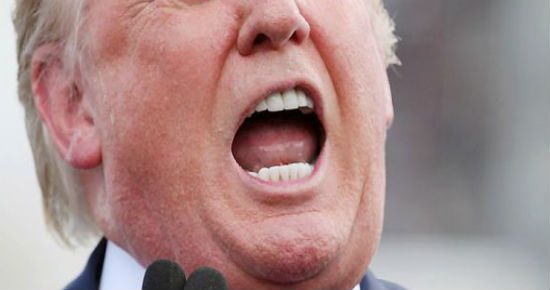From September 28, 2016, “The emotional integrity of a sincere liar”
Struggling to keep up with “A Week of Whoppers From Donald Trump,” Maggie Haberman and Alexander Burns wrote this in The New York Times:
Donald J. Trump has unleashed a blizzard of falsehoods, exaggerations and outright lies in the general election, peppering his speeches, interviews and Twitter posts with untruths so frequent that they can seem flighty or random — even compulsive.
However, a closer examination, over the course of a week, revealed an unmistakable pattern: Virtually all of Mr. Trump’s falsehoods directly bolstered a powerful and self-aggrandizing narrative depicting him as a heroic savior for a nation menaced from every direction. Mike Murphy, a Republican strategist, described the practice as creating “an unreality bubble that he surrounds himself with.”
The New York Times closely tracked Mr. Trump’s public statements from Sept. 15-21, and assembled a list of his 31 biggest whoppers, many of them uttered repeatedly. This total excludes dozens more: Untruths that appeared to be mere hyperbole or humor, or delivered purely for effect, or what could generously be called rounding errors. Mr. Trump’s campaign, which dismissed this compilation as “silly,” offered responses on every point, but in none of the following instances did the responses support his assertions.
Interview Trump’s supporters, though, and you’ll frequently hear that they love their candidate because he “tells it like it is.” One of the things they love the most about their guy is that they see him as honest — as someone who always tells them what he really thinks.
And that’s not wholly wrong. The mistake is confusing Trump’s sincerity for trustworthiness.
Donald Trump says many, many things that are not true. He makes assertions that brazenly contradict established facts, or that impossibly ask us to forget what he’d just said moments before. He’ll say “X” one moment and then, days or minutes later, he’ll say “Not X, never X, and I never said X.”

And the weird thing is that I think he means it. This is what Donald Trump — and many of his supporters — imagine constitutes truthfulness and honesty. It’s not about saying something that is true or accurate or factual, but about saying what you truly, sincerely feel. Dishonesty, in this view, entails not a denial of truth or of reality, but a denial of your own emotions. Courtesy, tact, and nuance are all, from this perspective, dishonest because they may not fully reveal the emotions, opinions, fantasies and preferences of the speaker.
This is why Secretary of State Clinton is perceived and portrayed as inherently dishonest. All diplomats are dishonest. They don’t speak from the heart and from the gut but, instead, speak diplomatically. They speak cautiously, weighing the impact of their words instead of just letting it rip.
Scientists are also inherently dishonest in this view. Their words are always hemmed in by the facts and the data, restrained from the satisfying sweeping generalizations and superlatives available to “honest” speakers who “speak from the heart.”
Those scientists would insist that such restraint is, in truth, due to their strict devotion to “telling it like it is.” But for them, “like it is” refers to external realities — the world, the universe, data, established facts. For Trump and his supporters, “like it is” is strictly internal. It means something closer to “like I want.”
That external and internal distinction, I think, is hugely important for this election and for all the culture wars and culture-clashes that it arises from and that it has exposed. It’s just as important as religion or region or education or any of the other big factors that usually come up when we try to figure out what separates and polarizes us.
On one side of that divide we have those who think that truthfulness has to do with speech that corresponds with external realities. On the other side we have those who think that truthfulness is a matter of passionate sincerity and sincere passion — of speech that corresponds with the speaker’s sentiments.
The latter camp puts the focus on something real and valid — insincerity is a legitimate cause for distrust. But that focus eclipses any consideration of the larger factor — the external reality that ultimately measures us all as trustworthy or untrustworthy. And the exclusion of any concern for external reality will cause us to see insincerity where none exists while imagining that clinging to repeated falsehoods is a form of integrity.
Think of any so-called “teacher’s pet.” If external realities are paramount, then the kid who always knows the right answer may still be resented for earning the teacher’s favor for always doing the homework, but neither the sincerity of the supposed “pet” nor of the teacher is in question. But if we elevate the emotional “integrity” of internal sentiment, then that kid just becomes an obsequious suck-up who only gets straight A’s because the teacher unfairly favors them. Insincerity is imagined and imputed because the denial of the actual, external causes misleads us to seek — and t0 fabricate — alternative explanations.
This external/internal divide also helps us understand why one of Donald Trump’s most frequent falsehoods — “I never said that” — becomes, for his supporters, further confirmation of his utter honesty. From the perspective of those who measure truthfulness by correspondence to external reality, Trump’s claims are provably false. Show clip No. 1: Trump saying, “I never said that.” Show clips Nos. 2-17: Trump saying that, 16 times. In this view, Trump’s statement is proved to be a lie and he is proved to be dishonest.
But for Trump and his followers, truthfulness is a measure of sincerity — of correspondence with internal sentiment. So Trump says, during the debate, that he was “smart” not to pay any taxes — a sincere, unfiltered expression of what he was feeling at that moment when he spoke those words. But asked about it an hour later he realizes that it wasn’t a smart thing to have said and he truly, sincerely wishes he hadn’t said it. That’s the sentiment behind his statement, “I never said that.” What he means is “I wish I hadn’t said that. It would be better if I hadn’t said that. I would like us all to pretend I’d never said that.” And that’s truthful — he really does wish he hadn’t said that. He really would like everyone to join him in pretending he hadn’t. He means that sincerely and genuinely, and thus his words align perfectly with his emotions and internal sentiments.
And thus, to him and to his supporters, he is being truthful.
This clash of understandings about what it means to be truthful has been at the heart of Trump’s campaign from the very beginning. His usual shorthand for referring to it is his attacks on “political correctness.” That term started as a parody of “liberal” concerns about biased language. Trump et. al. vaguely perceive that “PC” people sought to avoid such biased language because it might offend, but they missed the larger, more essential and important point: That such language is bad because it isn’t true — because it does not correspond to external reality. For Trump, the idea of restraining language to avoid offense is itself offensive because it violates his notion of “truthfulness” — of always saying exactly what you’re feeling when you speak. If what you’re feeling may strike others as rude, well, too bad for them — their delicate feelings shouldn’t be allowed to compel you to be dishonest by forcing you to pretend not to be rude when you’re feeling rude.
Again, he cannot see the larger point — that the complaint is not primarily about rudeness but about accuracy, about avoiding language that misrepresents external reality. He cannot see that because he doesn’t care about that external reality or see that it has anything to do with being truthful.
It’s often been noted that when someone says, “Pardon me for being politically incorrect, but …” they’re about to say something hateful and rude. But that’s not the biggest problem. They’re also about to say something that does not accurately conform to any external reality. And even that isn’t the biggest problem. The larger problem is that they don’t care whether what they are saying accurately conforms to any external reality. They only care whether it accurately reflects the sentiments and emotions they themselves are feeling — sincerely and “truthfully” — in the moment.












